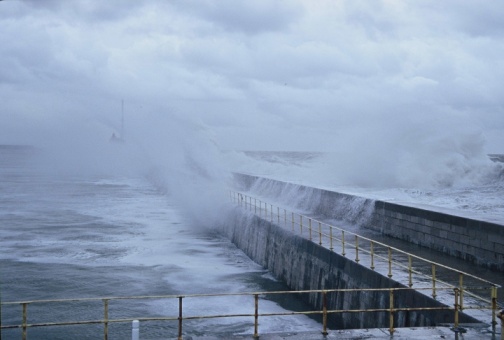Hurricane Sandy Blows Down Paywalls
 The metaphorical New York Times paywall, being battered by Hurricane Sandy. (Photo via ThinkStock)
The metaphorical New York Times paywall, being battered by Hurricane Sandy. (Photo via ThinkStock)
If you have the day off due to the impending storm, today’s your chance to read some of the best journalism around. Hurricane Sandy has leveled the paywalls at some of America’s top news outlets.
That means you can read more than the 10 articles a month you’re typically limited to at the New York Times. The Wall Street Journal, too, is totally free today, so even if the New York Stock Exchange is closed, you can fill up on all the business coverage you like.
The Globe, meanwhile, is posting all of their Sandy coverage on Boston.com. While the separation between Boston.com and BostonGlobe.com has been criticized in the past, this is a prime example of why the two standalone sites can sometimes work better than the New York Times paywall. The Times has to give away all of their content for free, while the Globe can limit it to just storm coverage.
The idea behind removing the paywalls, of course, is that people need to know what’s going on in emergency situations. And while I have no doubt that those media organizations really want to inform people about what’s happening, they also have an ancillary (and more self-interested) goal: Traffic. Lots and lots of traffic to their websites, as people constantly refresh to see where the hurricane is headed, what kind of damage has been caused, when power will be back on, if public transit is running, if the roads are closed, if schools are closed, and more.
Those eyeballs aren’t limited to just newspaper websites, of course. The Herald pointed out this morning that TV stations are expecting a ton of viewers:
It’s a sweeps month bonanza for Boston TV stations — the mammoth hurricane rocketing toward the East Coast is expected to draw big audiences during one of the most critical ratings periods of the year.
“Household-using-television levels will go way up during the news,” said communications professor Tobe Berkovitz of Boston University. “It gives the stations an opportunity to cut into regular broadcasting with their own special newscasts, which is also good because it gives them more commercial time and they can fill them with political ads.”
So: Take the opportunity, in between stocking up on hurricane rations, to learn some stuff. There’s some big national event happening next Tuesday where a little knowledge might come in handy.


